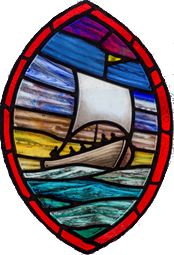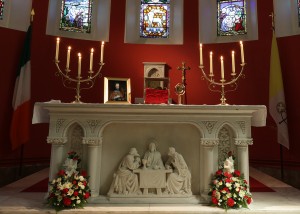FORMER BISHOP OF MEATH TO ATTEND VISIT OF THE RELICS OF ST. OLIVER PLUNKETT TO CAVAN
FORMER BISHOP OF MEATH TO ATTEND VISIT OF THE RELICS OF ST. OLIVER PLUNKETT TO CAVAN: First class relics of St. Oliver Plunkett will visit the Conaty Chapel of the Kilmore Diocesan Pastoral Centre in Cavan on Tuesday 4 June 2019.
The relics will arrive at the Centre at 10:00a.m. and will be available for veneration until 10:00p.m. that evening.
There will be a lunch-time Mass in the Chapel at 1:15p.m. offered by Rev. John Sexton, Chaplain to St. Clare’s Comprehensive School in Manorhamilton, for those doing examinations at this time.
Fr. Ultan McGoohan, Diocesan Director of Pastoral Services and Adult Faith Development, will celebrate Mass at 5:45p.m. and deliver the homily.
The former Bishop of Meath, Most Reverend Michael Smith, will be the principal celebrant at the 8:00p.m. Mass and give the homily. The music for this Mass will be provided by the choir from St. Killian’s Church in Mullagh.
There will also be opportunities to avail of the Sacrament of Reconciliation during the course of the day from 12 noon to 1:00p.m.; 4:30p.m. to 5:30p.m.; and 6:30p.m. to 7:45p.m.
Commenting on the forthcoming visit of the relics to the Kilmore Diocesan Pastoral Centre, Seán Coll (Centre Director) said, “This is the sixth year of the visit of the relics of St. Oliver Plunkett to Cavan. It is a very special day for us here in the Centre as we welcome people who come and seek the Intercession of St. Oliver Plunkett for one reason or another. For some, it is an opportunity to ask St. Oliver’s intercession as they face a particular difficulty or issue in their lives. For example, it may be health-related, financial or housing problems, difficulties in the family circle or relationship issues, looking for suitable employment and the like. Others may wish to pray for those undertaking important examinations around this time or are doing exams themselves. Some or someone close to them may be facing a crossroads in their lives of one kind or another. Every person will have their own story and their own needs. It is also a chance for people to thank the saint for his intercession in the past when their prayers were answered and to ask for his continuing help. It is very important to note, however, that the cause of the healing is God; the relics are a means through which He acts. In other words, relics are not magic. They do not contain a power that is their own; a power separate from God. Any good that comes about through a relic is God’s doing. But the fact that God chooses to use the relics of saints to work healing and miracles tells us that He wants to draw our attention to the saints as “models and intercessors” (Catechism of the Catholic Church, 828).
All are welcome for this very special event which is being organised by the Kilmore Diocesan Pastoral Centre with the assistance of the Knights of Saint Columbanus.
Petitions/Offerings may be sent to the Kilmore Diocesan Pastoral Centre, The Conaty Centre, Cullies, Cavan H12 E5C7. All petitions received will be placed beside the relic during its visit. Please write “St. Oliver” on the top left hand corner of the envelope.
For further information, please ring the Centre on 049 4375004.
Oliver Plunkett was born at Loughcrew, near Oldcastle in Co. Meath on 1 November 1625. Having studied at the Irish College in Rome, he was ordained a priest in 1654 and became Archbishop of Armagh and Primate of All Ireland in 1657. He maintained his duties in Ireland in the face of English persecution, reorganising the ravaged Irish Church, but was eventually arrested and tried for treason in London. Having being found guilty of high treason on perjured evidence, he was hanged, drawn and quartered at Tyburn on 1 July 1681, and became the last Roman Catholic martyr to die in England. Oliver Plunkett was beatified in 1920 and canonised in 1975 by Pope Blessed Paul VI, the first new Irish saint for almost seven hundred years.
The diocese of Kilmore includes almost all of County Cavan and a portion of Counties Leitrim, Fermanagh, Meath and Sligo.
The Catholic Church categorises relics from saints in three: first, second and third class. Body parts such as blood, bones or even ashes of a saint fall under the first category. Clothing worn by the saint, such as liturgical vestments, are considered second class, and personal possessions third.
Catholics venerate the remains of a saint as an expression of reverence for their holiness of life, and to seek the saint’s intercession for spiritual aid, healing, and particular graces.
Media Contact Person for this event: Seán Coll, Director of the Kilmore Diocesan Pastoral Centre, The Conaty Centre, Cullies, Cavan H12 E5C7 – telephone 049 4375004 (extension 102) or 087 6724338 – email [email protected]

